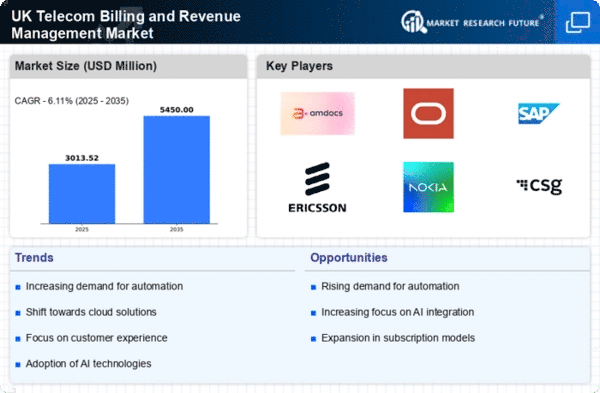Emergence of 5G Technology
The rollout of 5G technology is poised to transform the telecom billing-revenue-management market. With increased data speeds and lower latency, telecom operators are likely to experience a surge in data consumption. This shift necessitates advanced billing systems capable of handling complex pricing models and real-time data usage tracking. As of 2025, the UK telecom sector anticipates a 30% increase in data traffic, compelling providers to invest in robust revenue management solutions. The telecom billing-revenue-management market must adapt to these changes. This adaptation is essential for ensuring accurate billing and customer satisfaction. Furthermore, the competitive landscape will drive innovation, as companies seek to differentiate their offerings through enhanced billing capabilities.
Adoption of Cloud-Based Solutions
The shift towards cloud-based solutions is reshaping the telecom billing-revenue-management market. Telecom operators are increasingly adopting cloud technologies to enhance scalability, flexibility, and cost-effectiveness in their billing processes. This transition allows for real-time data processing and improved analytics capabilities, which are essential for managing complex billing scenarios. In the UK, the cloud services market is projected to grow by 20% annually, indicating a strong trend towards digital transformation. As telecom companies embrace cloud solutions, the telecom billing-revenue-management market is likely to witness a surge in demand for integrated billing platforms that can support diverse service offerings and customer needs.
Increased Focus on Customer Experience
Enhancing customer experience is a critical driver for the telecom billing-revenue-management market. As competition intensifies, telecom operators are prioritizing customer satisfaction to retain subscribers. This focus has led to the implementation of user-friendly billing interfaces and personalized communication strategies. In the UK, studies indicate that 70% of consumers are willing to switch providers for better service quality. Therefore, telecom companies are investing in advanced billing solutions that provide clear, concise, and accurate billing statements. The telecom billing-revenue-management market is responding to this trend by developing tools that facilitate customer engagement and feedback, ultimately fostering loyalty and reducing churn.
Growing Demand for Subscription Services
The rising popularity of subscription-based services is significantly impacting the telecom billing-revenue-management market. Consumers are increasingly opting for bundled services that include mobile, broadband, and entertainment options. This trend is reflected in the UK market, where subscription services have grown by approximately 25% in the last year. As a result, telecom operators must implement sophisticated billing systems that can manage multiple subscriptions and provide transparent invoicing. The ability to offer flexible payment options and personalized billing experiences is becoming essential for customer retention. Consequently, the telecom billing-revenue-management market is evolving to meet these demands, ensuring seamless integration of various service offerings.
Regulatory Changes and Compliance Requirements
The telecom billing-revenue-management market is significantly influenced by evolving regulatory frameworks. In the UK, regulatory bodies are enforcing stricter compliance measures to ensure transparency and fairness in billing practices. This has prompted telecom operators to enhance their billing systems to meet these requirements. As of 2025, it is estimated that compliance-related investments in the telecom sector will exceed £500 million. Consequently, the telecom billing-revenue-management market must adapt to these changes, ensuring that billing processes are not only efficient but also compliant with legal standards. This focus on regulatory adherence is likely to drive innovation in billing technologies.
















